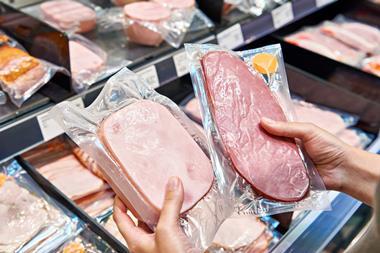Indies can put the mults to shame in the freshness race – but communication is key, says Alan Wyle
A few weeks ago Tesco took a whole page in a weekend colour supplement to tell us that all their lettuces were in store within 48 hours of picking. Big deal.
At the National Association of Community Run Shops (NACRS) we've been encouraging shops to work with small suppliers and residential growers for years. Our members' produce can make it to the shelf in a matter of hours.
My wife and I took over a village shop in the mid-1980s, long before the phrase "local produce" was invented. We were supplied local produce by two suppliers who lived in the village and visited us twice a day to see if we needed a top-up, meaning our produce could be on the shelf within minutes of picking. You can't get much more local or fresh than that.
In Lewes we have a weekly local produce market on a Friday morning. The lettuces and other produce are often picked that morning, are organic and travel only six miles. Imagine the effect on climate change if that could happen everywhere.
At NACRS we are spreading the word with our "Crop For The Shop" scheme, in which produce is grown to season and as organically as possible.
We encourage the production of varieties for taste, not for shelf life. The ideal scheme manager might need the diplomacy of Nelson Mandela, the expertise of an Alan Titchmarsh and the balls of a Margaret Thatcher to make it happen, but it's worth it.
More and more people are growing their own produce in their own gardens and allotments. Village shops can use their surplus. A supermarket could not. Shopkeepers have to source the best produce available locally and then display it effectively. They should label who has grown it, how and where, and it should be clear how many miles it has travelled to get to the shop. Publishing recipes using the produce and offering ingredients on special promotion can be effective.
The most effective way of promoting the shop and local produce is by producing and distributing a regular newsletter, whether through email or print. The newsletter can be used to promote local events and give villagers a way of communicating with each other. By selling space to local advertisers it can even turn into a nice little earner.
When we did one years ago we not only received free advertising for the shop, we also made a profit from the advertising revenue. Customers said they kept the newsletter by their telephone for when they needed a tradesman. The local plumber paid for a year up front because he said it was the best advertising he had ever placed.
Our members agree that us independents can beat the supermarkets hands down in the freshness game. And we need to communicate that. "Ours comes direct from the market daily and is much fresher that's why it lasts longer than supermarket produce, which has had its ripening 'arrested' in an artificial chilled environment," says one.
Another member points out that even if supermarkets do claim to sell local food, because of their vast supply chains, by the time it reaches the shelf it could have done a round trip of several hundred miles. He adds: "Objections to all food being controlled by a few firms and their buyers and all those excess food miles are what drives interest in genuinely local food." And thanks to that interest, independents can get one up on the multiples.
So, getting lettuces in store within 48 hours of picking isn't really much to make a song and dance about. We're winning the race. And there are certainly no limp lettuces here.
Local shops means local produce
1) Stock as much local produce as possible
2) Label the grower and how far it has travelled
3) If it looks limp, compost it
4) Advertise when the first fruit of the season will arrive
5) Organise tastings. Producers will gladly support you and tie it into special offers
How important is the issue of freshness to your customers?
Limited importance: 4%
Quite important: 26%
Very important: 70%
Do you offer fresh fruit & vegetables in your store?
No: 18%
Yes: 82%
Do you think you can compete with the multiples in terms of freshness?
No: 36%
Yes: 64%
On average how fresh is your fruit and veg on delivery?
Within 24 hours of picking: 4%
Less than two days old: 31%
Less than three days old: 28%
Less than five days old: 14%
More than five days old: 19%
Don't know: 4%
Would you like to stock fresher fruit and veg?
No: 42%
Yes: 58%
New in my store: Paul Fisher
Name of store: Fisher's of Gerrards Cross
Main suppliers: Nisa, Petty Wood, Bahlsen, Lindt, Quality from Small Producers, Goodness Foods, Tree of Life, Auguste Noel, Hider Foods, AB World Foods, Twinings, Wilkin & Sons.
How do you find out about new products? Nisa helps us keep on top of the major brands and we have good relationships with key account managers for specific market leaders.
What new products have you started stocking recently? Nut-free Christmas puddings, which we found at a trade show in Staffordshire; Beeswax Candles, who approached us at our Festival of Food and Drink in October; and Oak Aged Vodka, which is from our local supplier, Fabulous Vodka.
Is any product selling particularly badly. Why? Summer products are really dropping off now. This year has been particularly confusing, weather-wise.
Have you delisted any products recently? We have a strong relationship with our local community and we endeavour to provide the products they want from our store. If those products don't sell well, we try to promote them to a wider audience. A week on our tasting table has saved many a product from being delisted.
What other products have you got your eye on? We want to expand our gluten-free range, and we get a lot of customer requests. We also want more international products as we have a very cosmopolitan demographic here.
Propertyof the week
What: Convenience store and Post Office
Where: Paisley, Scotland
How much: Offers above £250,000 (annual rent £21,000)
Situated on one of the main thoroughfares through Paisley town centre, the Londis convenience store and Post Office on Broomlands Street is a well-appointed modern unit with quality fixtures and fittings.
The store features a professional layout with a designated area for the Post Office, which has a salary of circa £43,000 per annum.
The shop produces weekly sales of circa £16,000 excluding services, and has increased turnover from the sale of newspapers, confectionery and off-licence products.
For more information on this business please contact Pail Graham of Christie & Co on 01413 527300.
A few weeks ago Tesco took a whole page in a weekend colour supplement to tell us that all their lettuces were in store within 48 hours of picking. Big deal.
At the National Association of Community Run Shops (NACRS) we've been encouraging shops to work with small suppliers and residential growers for years. Our members' produce can make it to the shelf in a matter of hours.
My wife and I took over a village shop in the mid-1980s, long before the phrase "local produce" was invented. We were supplied local produce by two suppliers who lived in the village and visited us twice a day to see if we needed a top-up, meaning our produce could be on the shelf within minutes of picking. You can't get much more local or fresh than that.
In Lewes we have a weekly local produce market on a Friday morning. The lettuces and other produce are often picked that morning, are organic and travel only six miles. Imagine the effect on climate change if that could happen everywhere.
At NACRS we are spreading the word with our "Crop For The Shop" scheme, in which produce is grown to season and as organically as possible.
We encourage the production of varieties for taste, not for shelf life. The ideal scheme manager might need the diplomacy of Nelson Mandela, the expertise of an Alan Titchmarsh and the balls of a Margaret Thatcher to make it happen, but it's worth it.
More and more people are growing their own produce in their own gardens and allotments. Village shops can use their surplus. A supermarket could not. Shopkeepers have to source the best produce available locally and then display it effectively. They should label who has grown it, how and where, and it should be clear how many miles it has travelled to get to the shop. Publishing recipes using the produce and offering ingredients on special promotion can be effective.
The most effective way of promoting the shop and local produce is by producing and distributing a regular newsletter, whether through email or print. The newsletter can be used to promote local events and give villagers a way of communicating with each other. By selling space to local advertisers it can even turn into a nice little earner.
When we did one years ago we not only received free advertising for the shop, we also made a profit from the advertising revenue. Customers said they kept the newsletter by their telephone for when they needed a tradesman. The local plumber paid for a year up front because he said it was the best advertising he had ever placed.
Our members agree that us independents can beat the supermarkets hands down in the freshness game. And we need to communicate that. "Ours comes direct from the market daily and is much fresher that's why it lasts longer than supermarket produce, which has had its ripening 'arrested' in an artificial chilled environment," says one.
Another member points out that even if supermarkets do claim to sell local food, because of their vast supply chains, by the time it reaches the shelf it could have done a round trip of several hundred miles. He adds: "Objections to all food being controlled by a few firms and their buyers and all those excess food miles are what drives interest in genuinely local food." And thanks to that interest, independents can get one up on the multiples.
So, getting lettuces in store within 48 hours of picking isn't really much to make a song and dance about. We're winning the race. And there are certainly no limp lettuces here.
Local shops means local produce
1) Stock as much local produce as possible
2) Label the grower and how far it has travelled
3) If it looks limp, compost it
4) Advertise when the first fruit of the season will arrive
5) Organise tastings. Producers will gladly support you and tie it into special offers
Business Barometer
How important is the issue of freshness to your customers?
Limited importance: 4%
Quite important: 26%
Very important: 70%
Do you offer fresh fruit & vegetables in your store?
No: 18%
Yes: 82%
Do you think you can compete with the multiples in terms of freshness?
No: 36%
Yes: 64%
On average how fresh is your fruit and veg on delivery?
Within 24 hours of picking: 4%
Less than two days old: 31%
Less than three days old: 28%
Less than five days old: 14%
More than five days old: 19%
Don't know: 4%
Would you like to stock fresher fruit and veg?
No: 42%
Yes: 58%
New in my store: Paul Fisher
Name of store: Fisher's of Gerrards Cross
Main suppliers: Nisa, Petty Wood, Bahlsen, Lindt, Quality from Small Producers, Goodness Foods, Tree of Life, Auguste Noel, Hider Foods, AB World Foods, Twinings, Wilkin & Sons.
How do you find out about new products? Nisa helps us keep on top of the major brands and we have good relationships with key account managers for specific market leaders.
What new products have you started stocking recently? Nut-free Christmas puddings, which we found at a trade show in Staffordshire; Beeswax Candles, who approached us at our Festival of Food and Drink in October; and Oak Aged Vodka, which is from our local supplier, Fabulous Vodka.
Is any product selling particularly badly. Why? Summer products are really dropping off now. This year has been particularly confusing, weather-wise.
Have you delisted any products recently? We have a strong relationship with our local community and we endeavour to provide the products they want from our store. If those products don't sell well, we try to promote them to a wider audience. A week on our tasting table has saved many a product from being delisted.
What other products have you got your eye on? We want to expand our gluten-free range, and we get a lot of customer requests. We also want more international products as we have a very cosmopolitan demographic here.
Propertyof the week
What: Convenience store and Post Office
Where: Paisley, Scotland
How much: Offers above £250,000 (annual rent £21,000)
Situated on one of the main thoroughfares through Paisley town centre, the Londis convenience store and Post Office on Broomlands Street is a well-appointed modern unit with quality fixtures and fittings.
The store features a professional layout with a designated area for the Post Office, which has a salary of circa £43,000 per annum.
The shop produces weekly sales of circa £16,000 excluding services, and has increased turnover from the sale of newspapers, confectionery and off-licence products.
For more information on this business please contact Pail Graham of Christie & Co on 01413 527300.














No comments yet